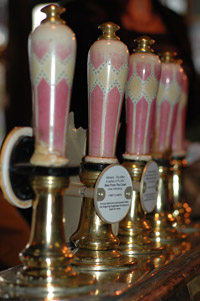 Melisa Cole offers a brilliant post today regarding the news that beer sales in UK pubs have slumped to their lowest level since the 1930s.
Melisa Cole offers a brilliant post today regarding the news that beer sales in UK pubs have slumped to their lowest level since the 1930s.
I’m a bit confused and bemused by this announcement and what it’s trying to achieve; because, to my mind, all this proclamation is going to generate is stories about beer not being popular any more, which – if we’re not careful – could surely just become a self-perpetuating prophesy.
As important, she points to a dichotomy that has a direct parallel in the United States. Independent and local brewers report growth of 7.5% per year at the same time larger breweries bemoan tumbling sales.
Much like in the U.S., where those who call themselves craft breweries enjoy double digit growth although overall beer sales remain flat. Here the smaller breweries have gone out of their way to point to these numbers whenever media business stories mention beer losing market share to wine and spirits.
In fact, the number of breweries in the UK is increasing and more pubs are selling cask-conditioned beer. Overall cask sales languish because the “big four” multinational brewers — who control 56% of the ale market — don’t support cask.
Cole writes:
The major problem I DO have is that, once again, the BBPA’s doom and gloom approach does nothing more than further damage beer’s image by painting it as a product that nobody wants.
What this report seems to say to me, when viewed in light of Pete Brown’s findings, is that, actually, fewer people want mass-produced products and that the big brewers are missing out by under-investing in their cask brands.
Sound familiar?
Further reading: Five reasons beer sales have slumped.
Isn’t the better comparator the stat cited in Ken Well’s Travels with Barley that in, say, the 1970s three-quarters of beer drunk in the US was in bars while in the early 2000s it was down to 25%? That information about place of consumption is different from what is being consumed which you quite rightly say is more and more craft beer.
Alan – I agree that the demise of pub culture is important, and a large part of this issue. In this case I just wanted to focus on the points Cole makes.
The BBC magazine article with a link at the end list “cultural changes” (including pub life) as one of its five reasons. I’d say some of the others are also cultural changes.
I think my point, in case you are interested, is that she has not made her point very well. It is not a vague generic cultural change that pubs are not as popular any more than saying AM radio has lost something of its lead in the technology race is or is not related to the slump in sales for the music recording industry. The best point is made in a comment to the BBC story – pubs do not exist in the way they did years ago. Craft beer will live or die in the future drinks sales marketplace competing for home sales given the shift on both sides of the Atlantic away from tenements or two-ups-two-down to homes which are social centres.
Remember that she is writing for a UK audience, and not trying to be all encompassing. The future of the pub – which is still a much stronger institution in the UK than the US – is an ongoing discussion that many who read her blog have seen plenty about.
I think it is fair to stop at emphasizing a) that focusing on tumbling beer sales sends a bad message and b) multinationals aren’t very good at serving a specialty market.
The points you make are valid, but I don’t think we need mark her down for not going into all of that.
The main reasons for the demise of UK pub culture must surely be the ‘smoking ban’ and supermarkets selling beer at below cost price.
People in the UK still want to drink beer but they want to drink it on thier own terms.